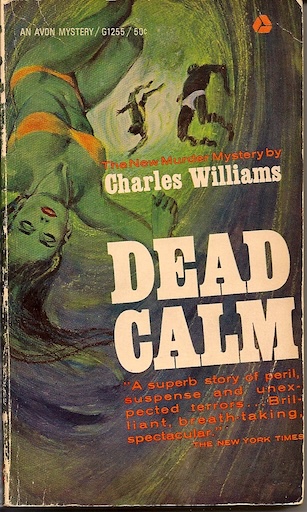Dead Calm by Charles Williams
Tags: thrillers,
John and Rae Ingram are on their honeymoon, sailing across the Pacific towards Tahiti in their private ketch, Saracen. Stuck for days in dead calm, twelve hundred miles from land, they spy another craft, Orpheus, listing on the horizon. John Ingram, an experienced sailor, can tell by the sluggish way Orpheus rights itself in the rolling swell that she has taken on water. He fires up Saracen’s auxiliary engine and heads toward the other boat to see if anyone needs help.
Before he gets there, he encounters a young man rowing furiously toward him with all his strengh. When Hughie Warriner reaches the Saracen, Ingram and his wife pull the young man aboard. He appears to be in shock, as if fleeing some terror.

Ingram asks Hughie what happened as Rae does her best to calm the obviously rattled man. He tells them Orpheus set out from Mexico twenty-six days prior with four people aboard, also headed for Papeete in Tahiti. The other three passengers, Russell and Estelle Belew and Hughie’s wife Lillian, ate contaminated salmon from a can and died of botulism. Since their death, Orpheus took on enough water to submerge its engine and batteries. Trapped in the windless heat of the South Pacific, the boat could not move and was destined to sink.
Ingram tells Hughie he will board the Orpheus to collect the ship’s log and Hughie’s money and passport. He will need the latter to enter Tahiti. Hughie recoils in terror at the idea and urges Ingram not to board the ship. This makes Ingram suspicious, and when Hughie falls asleep from exhaustion, Ingram rows the dinghy to the other boat and goes aboard to have a look.
The water below deck is almost three feet deep, but the boat appears uninhabited, except for a small cabin in front whose door is bolted shut from the outside. Ingram goes in to find two passengers in distress. Hughie’s wife, Lillian, is naked and shaking in terror while the brutish Russell Belew is ready to smash Ingram’s skull in with a club. The only thing that stops him is Lillian calling out, “Stop! It’s not him.”
Ingram realizes that Hughie Warriner is a psychopath who has tried to murder his shipmates and then abandoned them on a boat that will sink before the next dawn. And he’s left this man alone on his own boat with his wife!
He gets in the dinghy and begins rowing back toward Saracen to warn Rae and to protect her. She sees him coming and fires up the engine to meet him halfway. The engine wakes Hughie, who comes on deck and sees that Ingram has unconvered his lie. The psychopath beats Rea unconscious, turns the boat around, and takes off full throttle, leaving Ingram and the other two to drown in the sinking Orpheus.
Now, how’s that for trouble?
Ingram watches helplessly as the madman disappears over the horizon with his injured wife. He has to come up with a plan to save Orpheus and hope that Rae’s resourcefulness will allow her to survive.
As dark as the story begins, it gets darker. With no engine and no wind, Orpheus can’t move. She begins to flood faster than the crew can pump. A passing storm damages the boat further. And as the infinitely resourceful and determined Rae comes up with plan after plan to wrest control of Saracen from the psychotic and overpowering Hughie Warriner, the psychopath thwarts them all.
“Conscious evil or malicious intent you could at least communicate with,” Rae reflects, “but Warriner was capable of destroying her with the pointlessness and the perfect innocence of a falling safe, and with its same imperviousness to argument.”
Dead Calm excels as both a suspense and action thriller. This may be the tensest book I’ve ever read. Both Rae and John Ingram are infinitely determined and resourceful against all odds. As Lillian Warriner watches Ingram in awe as he puts his final, last ditch plan into action, she thinks, “My God… they shouldn’t match him against just one ocean at a time.”
All of the characters are well drawn, and the action (there’s lots of it) rings true. The author spent ten years in the merchant marine and knows his way around a boat. He also knows how to navigate, which becomes a key and fascinating part of the story. In those days before GPS, a good mariner could find his way across thousands of miles of undifferentiated sea with just a compass, the sun and stars.
It makes you think of the thousands of years of hard-won knowledge our civilization gives up in exchange for modern technology’s easy answers. These skills, like so many others we’re turning over to computers and AI, will atrophy from lack of exercise, and in many areas, the generations that succeed us will have less knowledge than the generations that came before.
In addition to physical action, the book has a strong psychological component, as Rae intuitively probes the roots of Hughie’s psychosis, so she can find her way into his troubled mind.
It’s no wonder this one was a best seller when it came out in 1963. If you’re looking for a book that will keep you up all night, this is it.